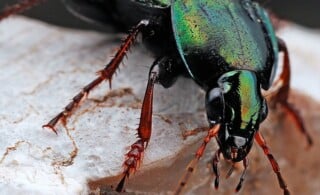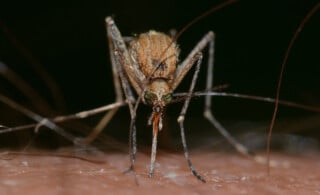
What’s reddish brown and black, 1/8th of an inch big, and can lay 2,000-3,000 eggs in a week? A flea. That started out sounding like a bad joke, but flea infestation is no laughing matter. Most people think that fleas only affect domesticated animals, but they’re sadly mistaken. Birds and other little critters that visit your backyard are likely to be the carriers that invade both your pet and your house. Plus, it’s a little disturbing to know that nearly half of flea infestations occur in structures without pets.
Flea Prevention
There’s an adage that holds true to flea infestation, “an ounce of flea prevention is better than a pound of flea cure.” In order to prevent fleas, it’s necessary to clean habitually as well as bathe any pets on a regular basis. Cleaning should especially include where your pets eat, sleep, and play. You should also vacuum the house thoroughly, including all furniture, rugs, and drapes. To further aide flea prevention, you should remove and dispose of the vacuum bag afterward to keep it from becoming an incubator for the flea larvae.
You can also help to prevent fleas by:
- Using washable pet bedding
- Restrict your pet to a regular sleeping area
- Keep wild animals away from the house
- Flea and ultrasonic collars for your pet
Flea Detection
However hard you may work toward flea prevention, it doesn’t always work. You may find yourself infested no matter how often and how thoroughly you clean. Fleas can find their way into your home and when they do it’s best to detect them early. Fleas spend a lot of their time on a pet when possible, but you may also find them on your furniture, your carpet and rugs, in your car, or out in the yard. You sometimes might not even see them at all, but they do have a way of leaving a trail besides noticing that your pet is scratching.
If you find little black specks occurring regularly around the house, it could be a sign of flea droppings. One way to find out is to put the dark specks in hot water and if they turn the water red or brown, then you know you have fleas and it’s time to look toward flea extermination.
Flea Extermination
Once you’ve discovered that fleas have taken hold of the place, it’s time to take action and prepare for flea extermination. There are two ways to do this: do it yourself or call in a professional. The next step is figuring out which one you want to do. Most homeowners spend between $100 and $300 in professional flea extermination costs.
DIY Flea Removal
If you’re looking to do it yourself, you should be forewarned that flea extermination is not an easy task. Fleas are pesky, hard to find, and can be anywhere from the backyard to the living room rug. You’ll need to either purchase or rent the proper equipment and make certain that you’ve got the proper chemicals to succeed in the job. You’ll also need to make sure that the chemicals are properly regulated and measured in the correct dosages. Any mistake may result in ruining furniture, killing the grass, or even poisoning your pets and family.
Ready to start your flea removal?
Find ProsHire a Pro
Those reasons alone are enough to consult a professional at least from the beginning for flea extermination. It doesn’t mean that you have to use the professional, but getting quotes from an experienced and reliable source is always a plus. A professional flea exterminator already has the equipment and the knowledge to choose which chemicals to use based on the situation and which areas are already affected.
In addition, flea exterminators only take an hour or two to treat the entire house and yard, whereas as a do-it-yourself project will take you an hour or two alone to research just what you need to get in preparation, let alone actually getting the tools and completing the task. When you have a flea infestation, fleas are something you have a lot of as compared to time. So, in the long run, consulting a professional is probably the best way to go from the start and it can save you from having to deal with those pest any longer than necessary.
 A Homeowner’s Guide to Entomology and House Insects
A Homeowner’s Guide to Entomology and House Insects  Getting Rid of Raccoons: Problems and Solutions
Getting Rid of Raccoons: Problems and Solutions  An Eco-Friendly Yard: How to Keep Bugs, Weeds, and Other Nuisances Out Without Harming the Planet
An Eco-Friendly Yard: How to Keep Bugs, Weeds, and Other Nuisances Out Without Harming the Planet  Itching for a Solution on Mosquito Control?
Itching for a Solution on Mosquito Control?  Got Gopher Control?
Got Gopher Control? 

Are You Familiar With This Topic? Share Your Experience.